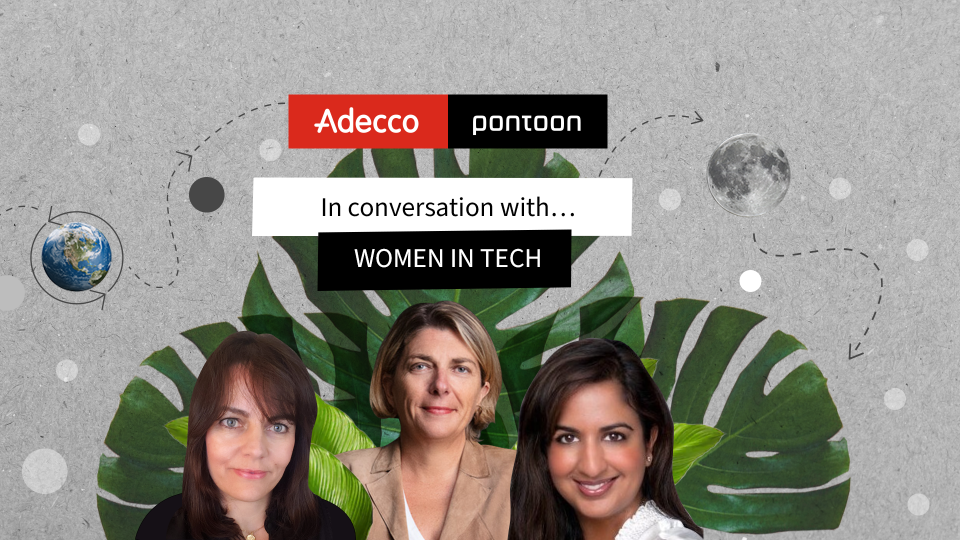
Corinne Ripoche sat down with industry leaders Pavan Kochar, CEO and Co-Founder of Certree, and Lesleigh Seagram, Global Head, VP Fieldglass at SAP, for a conversation about empowering Women in Technology. In the first of the two-part interview, the three leaders discussed ways to encourage STEM interest in future generations.
In the conclusion of the interview, the women turn their focus to women in the tech workforce. Through the power of mentoring and business culture, organizations work to retain and grow women in leadership within this industry. Furthermore, women’s EQ and STEM IQ is a powerful combination that more and more organizations are tapping in to. With more women taking executive roles, there is an opportunity to build on that success and inspire a wave of support throughout every level in an organization.
What advice do you have for females graduating with STEM degrees, and what does female representation mean for the tech industry?
 Pavan Kochar: One thing I’ve learned in my career is that there are so many different functions or job roles that are needed to make tech work that really require an empathic response to your consumer.
Pavan Kochar: One thing I’ve learned in my career is that there are so many different functions or job roles that are needed to make tech work that really require an empathic response to your consumer.
The technology education will teach you to think in a certain way, and there are so many roles to apply that way of thinking towards. There’s quality assurance, architecture, product management, marketing, UX user experience, and so many more. Having empathy and understanding user behaviors and usability of tech products are great attributes that females can bring to organizations.
 Corinne Ripoche: I like that point, Pavan. What is becoming more and more important is this difference between IQ and EQ. And I think this is where women, female leaders and females in tech, must be included in tech advancements because we usually have better EQ than our male counterpart. Females are needed for transformations and disruption. EQ is needed to create the New World.
Corinne Ripoche: I like that point, Pavan. What is becoming more and more important is this difference between IQ and EQ. And I think this is where women, female leaders and females in tech, must be included in tech advancements because we usually have better EQ than our male counterpart. Females are needed for transformations and disruption. EQ is needed to create the New World.
In my point of view, here we can clearly come back and say that women can bring something that others can’t or will bring it in a different way. We should be open and share more ways of how to achieve something and not only with the same approach and with exactly the same configuration that we had in the past. This is where we will make a big difference.
 Lesleigh Seagram: Agreed, this is where organisations can step up and facilitate an environment for that to happen. Recognize that the world is evolving. Talent is evolving. There are so many aspects that somebody can bring – to the organization, to their role, to the team – that may have been ignored previously or were previously focused on something else. For organisations to accept that and appreciate that, and really provide an environment to foster and nurture that, I think is critical as well.
Lesleigh Seagram: Agreed, this is where organisations can step up and facilitate an environment for that to happen. Recognize that the world is evolving. Talent is evolving. There are so many aspects that somebody can bring – to the organization, to their role, to the team – that may have been ignored previously or were previously focused on something else. For organisations to accept that and appreciate that, and really provide an environment to foster and nurture that, I think is critical as well.
What is being done to support female founders and female-led tech start-ups?
Corinne: Another question for you Pavan, maybe more on the fact that you have your own start-up, you have your own company. I have read several articles saying that it’s more difficult to raise funds as a woman in tech. Is it really true or just a question of determination and being convinced by what you have built?
Pavan: It’s a great question and I don’t know that I’m qualified to respond because we haven’t really raised money for our company yet. But what I do know from peers is that at the end of the day, the investments are based on the credentials and the viability of the company and so much of that is the leadership. Should that leadership be a female? Should that leadership be a thriving individual that has built something very meaningful for an organization that’s going to obviously lead to financial results? Then I’d like to think that we’re in the same sort of playing field.
However, I do know in some cases that women are not being seen as founders and or entrepreneurs. But I think that’s changing. I’ve seen, especially in Silicon Valley, so much attention and so much effort and funds being released for female founders. New funds specifically encouraging women to start companies. I think that says a lot, that our society is taking steps forward to ensure that they are considering female-founded, female-lead companies in terms of investment.
In recent history, more women have been appointed executive roles, particularly in the tech space. How do we build on this momentum?
Corinne: Yes, it’s an interesting point, because when you look at that from the corporate point of view, you see we have examples of female-led companies. Previous CEO of IBM: Ginni Rometty. Previous CEO of HP: Meg Whitman. CEO of Yahoo: Marissa Mayer. COO of Facebook: Sheryl Sandberg. So you can see that in big tech companies, they have given women the chance to lead them. And this is telling, to be honest. But when you go to the level below, we are still seeing that it’s difficult for women to be there.
So then when you look at some of these big tech companies with a female as the leader, you can see that we do not – to impact what we said previously – we do not build on that. We need to build on that.
Corinne Ripoche, CEO Adecco Americas and Pontoon
Pavan: That’s well said, Corinne. We need to say that again: we do not build on that. We need to build on all of the amazing things females have done. And it’s all of those leaders that you mentioned and so many more.
Corinne: Honestly, I think we are vocal enough in sharing why she is there. She’s not there just because she’s a woman. Let’s be vocal and say she’s there because she has a result. You do not take a female to board if she’s not bringing a result, so we clearly need to speak about it.
Lesleigh: No, I couldn’t agree more, and I love what you’ve just said. We don’t build on it and you know, I think that’s a perfect platform. I’m sure they’re doing a lot within their organisations, and their voices should be just as loud outside of the organization, in the industry. Also, within organisations, you may not be the CEO or the COO, but there are also women at high leadership levels where there is so much more we can do.
Can mentoring programs in organizations spark this momentum?
Corinne: Yes, we spoke in part-one about mentoring. Pavan said she’s mentoring a lot of people. Lesleigh I think you do the same, I’m mentoring as well. But do we think that this is enough?
How can we get that snowball effect? With the snowball effect, you start with a small snowball and as you keep adding more snow, the bigger your snowball is. How can we encourage the people that we are monitoring to also become mentors? Typically, we are mentoring people at the level below our level. So how can these people then mentor people at the next level below, and then they become mentors for the next level and so on? You know we can increase the snowball and as the snowball becomes bigger and bigger, we have more voices.
Lesleigh, you use the word ‘bold’ earlier, and I think it’s an important point. I think we are not enough bold to encourage others to mentor, you know at a different level than only at the leadership level or VP level or even director level. Do we have some ideas here or do you have some programs at SAP Fieldglass or Pavan if you have something in your organization where everybody can mentor somebody? To increase and to become more vocal than what we do today.
Lesleigh: I think that’s really interesting and we tend to do some of that, though probably not nearly enough as we should. You know, we do have folks within my team and my organization that has been identified as a future leader and are being mentored. But I agree with you, we don’t focus on how do we enable them to then fulfill that role and pay that forward, to mentor and coach others.
I think it’s about really realizing the value that you bring to the table. We all have unique attributes that we bring to our job, to our organization, to our network.
Lesleigh Seagram, Global Head & VP of Fieldglass Partner Channel at SAP
Even as you may think it’s inconsequential, it may be something that’s really valuable that others see in you. Then leaning in on that and really leveraging it by mentoring others and helping them understand the value that they bring that they can pass on to others. I think it’s a great idea.
Pavan: Absolutely, I echo what Lesleigh said. It’s really about ensuring that they resonate with the mission of having more women in tech and empowering them. As a leader, how do you empower? Do your leaders and colleagues encourage other women to join as developers or tech leads or in other roles? I think it’s really about ensuring that the perspectives are aligned and they have a passion for the cause and want to do something about that, whether it’s helping to recruit additional females in tech or helping to support and mentor others.
I am personally very passionate about ensuring that I have a very diverse team. I’ll be honest, it’s hard to find lots of female engineers. But I know that diversity breeds creativity. And we need that, as we build a product and take it to market. And in serving the community as well, it’s very important to have diversity in all aspects.
Pavan Kochar, CEO and Co-Founder of Certree
Lesleigh: We did a session with one of our leaders and he shared thoughts on the multiplier effect and being cognizant of that in everything that you do when you are looking at recruiting, when you are looking at mentoring, when you are looking for facilitating growth, keeping in the back of your mind that multiplier effect – is this going to help me multiply the growth of women in the organization or in the industry? I think as is something that we could all be doing.
By providing clarity on potential career paths for STEM students and skills paths for hiring teams, we can bring further diversity to tech organisations. Do you agree?
Corinne: It’s a super fair point and I like Pavan what you said – that diversity brings creativity and I think that we are not saying that enough with female engineers. And looking now with the upskilling and reskilling that we can do. Thinking to what we do at the Adecco Group and Pontoon for that, skilling to make sure that we have female and diverse people within the group.
It’s extremely important to have a clear diversity within the classroom, but also making sure that after we have a clear career path as well. Because as both of you have said, you can start as a coder, but after that there are so many other jobs you can take with having the tech approach. Being an engineer is giving you a way of thinking. It’s just giving you a way of thinking and you can bring that way of thinking into so many other jobs. Even into roles like Head of Transformation or CEO or COO.
Maybe it’s also a question of communication – the way we communicate to the younger generation for what it means to be female in tech?
Pavan: I think Corinne it’s such an important question and I think it’s an all-around understanding and exposure. As a STEM student, I had to go through very difficult coursework, but at the end of the day what it taught me was technology in general and how to look at things and what tech can do and how it can bring amazing applications to this world and so as a result you know I was then exposed to taking technology to market.
And so what does that mean? For enterprise customers, and I think Corinne to answer your question more directly, it’s about exposing people to the options. And I say people because I’m not sure all students know what the options are after they get a computer science or computer engineering degree. It’s all about exposing the younger generation to different types of roles, and not just through education and credentials.
Corinne: I echo that completely and I think again we are not vocal enough on that. I think it’s just a question of communication and being vocal and saying that more often.
Lesleigh: I agree, it’s having those conversations early on. My advice to our interns and those I mentor is to always stay curious and stay inquisitive. Having that conversation early in their studies or career, it helps to show them what the art of the possible in STEM.
Watch part one of the interview here
About the panelists:
Corinne Ripoche is CEO of Adecco Americas and Pontoon. Corinne is a global leader with an activist mindset and clear customer-centricity. She is driven by data and knows that purpose and experience within the hiring ecosystem is central to success. Corinne is a member of C200, Paradigm for Parity, and Women’s Business Collaborative.
Lesleigh Seagram is the Global Head & VP of Fieldglass Partner Channel at SAP and is responsible for developing and executing Partner GTM Strategy, ensuring partner and customer success. Her career at SAP spans 20 years, where she’s focused on transparency and authentic leadership as the foundation to build trust and loyalty of her team, customers and partners. Lesleigh advocates for coaching and mentoring of young woman in tech, as well as creating awareness on Diversity & Inclusion in the workplace. Lesleigh originally hails from South Africa and currently resides in Dallas, Texas.
Pavan Kochar is Co-Founder and CEO of Certree, an anti-fraud platform with the purpose of safeguarding data privacy. Prior to Certree, she was co-founder and CEO of Ubertal, a global technology services company focused on delivering innovation as a service. Pavan spent 15+ years in the technology industry holding leadership positions at firms such as Accenture, Deloitte and several others. She is a member of YPO, EO, Athena Alliance, and President of Akhand Jyoti USA. Pavan resides in Silicon Valley and holds a B.S. in Computer Science/Engineering and Bioengineering from the University of Illinois at Urbana-Champaign.
